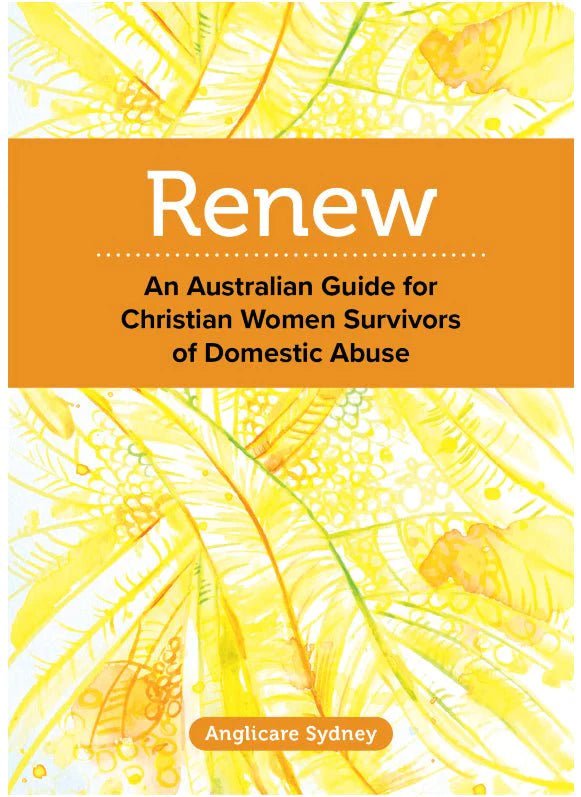Domestic & Family Abuse
At Christ Church St Ives, we take all disclosures of domestic abuse seriously and seek to offer care that is informed and compassionate.
Domestic abuse is a major issue in our society and sadly, it can and does take place within marriages and families in churches like Christ Church. We want all church members to be well informed about this challenging issue, and to continue to work at preventing abuse in all its forms and provide care that is informed and compassionate.
On this webpage you’ll find an outline of domestic abuse, what the Bible says, where to go for help, how to respond to a disclosure of abuse and offer help, and resources for those healing from domestic abuse.
If you are going through domestic abuse at present, please know that you are not alone, help is available. If you are feeling unsafe or in imminent danger please call 000 and if you would like confidential advice within the church, please approach a member of the ministry team with whom you feel most comfortable.
As part of raising awareness and prevention of Domestic and Family Abuse within our church community, the following video was shown during Sundays Online at Christ Church St Ives on 31 May, 2020.
What is Domestic Abuse?
The legal definition of domestic abuse in NSW is:
“Any behaviour in a domestic relationship that is violent, threatening, coercive or controlling or makes a person fear for their own safety or the safety of others”.
It is a pattern of behaviour that seeks to coerce, control, intimidate, hurt or frighten people in an intimate or family relationship.
Anyone can be a victim of domestic abuse however women are much more likely to be victims than men. It includes but isn’t limited to:
-
Using emotional blackmail or speaking in ways that tear down, belittle or blame.
-
Making threats to harm an individual, children or pets.
-
Hitting, punching, choking.
-
Controlling finances, denying access to bank accounts, taking wages.
-
Putting pressure on, or forcing sexual acts without consent or protection.
-
Preventing someone from going out and systematic isolation from family and friends.
-
Misuse of scripture or forcing a person to act against their beliefs.
If you have experienced abuse of this kind, please know that it’s not your fault and you are not alone. God’s Word condemns domestic abuse in all its forms and explicitly forbids abuse in marriage. You are loved and valued by God; he hears the cries of the oppressed (Psalm 82) and we will respect, listen and believe you.
What does the Bible say?
Learn through this resource.
Listen here to Nigel’s Sermon and interview with Sally Sims on ‘Love is Safe’.
How can I know if I am in an abusive relationship?
Listen to this podcast.
If you are a perpetrator of this kind of abuse, your behaviour is wrong and may be a criminal offence. You must stop.

Where do I go for help?
NSW Family & Community
services support and information
-
Police: 000
Lifeline: 13 11 14
-
Learn about how we care at Christ Church here.
-
1800 65 64 63
24/7 telephone crisis counselling and referral service for women available
-
1800 737 732
24/7 confidential information, counselling and support service for domestic abuse available
-
View the list here.
-
1300 651 728
View the Anglicare website here.
-
1300 78 99 78
24/7 telephone and online counselling service for men with emotional health and relationship concerns available
-
13 21 11
-
Full Stop Australia is one of the country’s leading sexual, domestic and family violence response and recovery services. See the website here

How do I respond to a disclosure?
Caring behaviours should prioritise safety, trust, choice, collaboration and empowerment.
-
Let the person tell their story in their own words without interrupting, don’t ask for proof. Pray for wisdom.
Be a safe person. Don’t minimise the perpetrator’s behaviour or dismiss the person’s concerns.
Reassure the person that abuse is not ok and it’s not their fault.
-
Respond with compassion and reassure the person about confidentiality but explain that you will have to inform a senior staff member or the care coordinator.
-
Make a safety plan, encourage the person to have a bag packed and work out where they could go if needed. Be aware that the most dangerous time is when a victim is leaving a domestic abuse situation.
Work out who would be best to talk to the perpetrator, and be aware that it can heighten the risk for the victim
-
Avoid simplistic solutions and don’t tell them what to do (they have been robbed of their decision-making freedom).
Our role is to empower, provide emotional and spiritual support, and help in practical ways.
Help them think through what they want to do. There is no one size fits all.
-
Let the person know what help is available; they may need help to access it.
Children are harmed by witnessing domestic abuse and reports about unborn babies, children and young people at risk of significant harm can be made to the Child Protection helpline on 13 21 11.
-
A disclosure of abuse can impact us in various ways, so make sure you have the support you need.
Further information on responding to abuse in churches
Domestic abuse flow chart, Anglican Diocese of Sydney
Understanding and responding to domestic abuse, SAFER, a resource for Australian churches
Healing and recovery
Healing from domestic abuse is often long and arduous. Trauma can impact us in many ways and leave victims feeling hyper-alert, numb or exhausted. Physical and emotional healing after leaving an abusive situation takes professional support and ongoing help from family and friends.
For a list of recommended christian Counsellors see here.
It can be helpful to have someone you trust to pray with regularly. You will need time to heal and grieve well. Lament helps us to place our pain in the hands of our loving God and the Psalms give us a rich resource of language and permission to bring our feelings and experiences before God in prayer.
-

Renew: An Australian Guide for Christian Women Survivors of Domestic Abuse
This Anglicare publication draws on the latest research and practical wisdom and addresses the practical, emotional and spiritual needs of a survivor of domestic abuse’. It’s helpful for those recovering from domestic abuse and those who wish to help.
-

Leslie Vernick podcasts and book ‘The Emotionally Destructive Marriage-How to Find Your Voice and Redeem Your Hope’
Leslie Vernick has worked as a biblical counsellor and clinical social worker for more than 35 years. She is a Christian author, speaker, podcaster and online coach and has helped countless women in unhealthy and destructive marriages.

A prayer for you, by Sydney Anglicans
Loving God, we acknowledge with sorrow the harm many experience because of domestic abuse. We grieve that although you created us for loving relationships, our relationships can be distorted and dishonoured through the sin of violence.
We pray for women, children and men who suffer as a result of experiencing violence in their own homes. Please bring healing and hope to these victim survivors of domestic abuse. We pray for those who perpetrate violence against their spouses and children. We ask they will cease to cause harm to those they are supposed to love and protect and will instead repent of their sin, and seek to be restored to faithful living under Christ.
Father, help our churches be safe havens for those who have experienced violence and abuse; where they can find comfort and healing in a loving community ruled by you, our just and merciful God. Father, we long for the day of Jesus' return and that heavenly home where we will dwell with you – in true safety, without fear, in loving relationship with you and one another.
In Jesus’ name, Amen.


